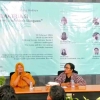Adam Mauliawan Hasan
Student of Fakultas Hukum
Universitas Gadjah Mada International Undergraduate Program
Adultery is a form of misconduct which the perpetrator is a man and a woman who have sexual relationship without marriage bond. Fornication which if performed by a man and a woman who have no ties of marriage but one or between them was already bound in marriage, then in this case it can be applied by adat law and criminal law.
Fornication committed one or both are already married is wrong and regulated in the Criminal Code, with the provisions on adultery under Article 284. In Article 284 paragraph (2) explained, "Tidak dilakukan penuntutan melainkan atas pengaduan suami/istri yang tercemar, dan bilamana bagi mereka berlaku pasal 27 BW, dalam tempo tiga bulan diikuti dengan permintaan bercerai atau pisah meja dan tempat tidur, karena alasan itu juga". It can be seen from Article 284 paragraph (2) that adultery was prohibited, but it can be processed in the criminal law if there is a complaint from the husband or the wife otherwise it cannot be processed because it is private kind of term.
As for fornication committed by a man and a woman who are still single are not subject to the provisions of the Criminal Code, because fornication is done with mutual consent between the two. But there was a judge who makes a suprised decision that adultery made by a man and a woman who was single will be given a verdict in the court. According to the judge, we should not just focus on formal law but also the law carried out with justice. Because the prosecutor include Article 378 of the fraud, in which the word "barang" are considered as well as the services and incorporate the honor as an object, then the Judge utilizing the aforementioned article remedy for justice, because the case of women giving her honor and the man promised to marry her, by because it is included in the fraud because of broken promises man.
In Adat law, fornication committed by people who either or both have been bound marriage, many indigenous peoples would give sanction of ostracized, expelled from the alliance of indigenous and etc in accordance with the adat law of the region. According to custom Lampung also set about fornication committed spouse others mentioned in Kunta Raja Niti (KRN) that the trial should be honest and witnesses as well as evidence to sentence obligated to pay fines and other costs. Whereas in the traditional Minangkabau sanctions be disposed of indigenous peoples and the penalty of death.
Adat law provisions would be more eager to highlight how deplorable fornication, because it animates communion indigenous people themselves. Recognizes indigenous peoples given sanctions for acts that violate, have binding legal force as well as the Criminal Code, because the sanctions were given such a decision and agreement and based on the customs union decision of indigenous leaders. Problems related to the act of adultery set out in the Criminal Code, not in accordance with the values of decency Indonesian religious communities and Muslim majority.
The application of criminal law in a common law commonly called adat criminal law. In criminal law Article 1 (1) of the Criminal Code which is described the principle of legality “Tiada suatu perbuatan dapat dipidana kecuali atas kekuatan aturan pidana dalam perundang-undangan yang telah ada, sebelum perbuatan dilakukan” If specified, then Article 1 (1) contains two things: a criminal act should be formulated / mentioned in the regulations of the laws and regulations of this law should exist prior to the crime. Where Article 1 (2) deviate Article 1 (1) of the Criminal Code which reads “Jika sesudah perbuatan dilakukan ada perubahan dalam perundang-undangan, dipakai aturan yang paling ringan bagi terdakwa”.
The principle of legality explained that an act of a criminal offense can be punished if there are provisions of laws and regulations that govern while if the act a criminal offense absence of that set, then such actions can not be in law, thus providing legal certainty, it is not in accordance with adat law by therefore cause a shift in the formal legality principle to the principle of legality materially.
The principle of legality material described in Article 1 (3) RKUHP “ketentuan sebagaimana dimaksud dalam pasal 1 ayat 1 RKUHP tidak mengurangi berlakunya hukum yang hidup dalam masyarakat yang menentukan bahwa seorang patut di pidana walaupun perbuatan tersebut tidak di atur dalam peraturan perundang-undangan”. Law living in the community are adat law, so that the application of adat criminal law which is not based on the Criminal Code and legislation outside the Criminal Code, which referred to the unlawful nature of the material. Unlawful nature of the material that is an unlawful act, not only contained in the law (written law) but should be seen the enactment of the principles of unwritten law.









